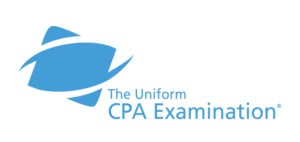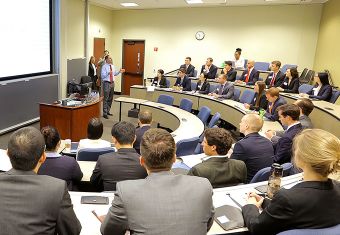The CPA Exam
A certified public accountant, or CPA, is a special, professional designation. It can only be earned through a combination of education, experience and licensing.

To become a CPA, you’ll need to be licensed by a state board of accountancy. Beyond the prestige of earning this respected credential, becoming a CPA carries numerous benefits, including opportunities to increase your authority and responsibility, and, typically, your salary.
While specific requirements for the CPA license vary from state to state, they all require extensive coursework in accounting. Earning a Master of Accounting degree will help you prepare for and pass the Uniform CPA Exam, the test all aspiring accountants must pass prior to earning their license to practice.
Graduates of the UNC Kenan-Flagler MAC Program consistently perform exceptionally well on the exam. Our first-time pass rate is among the nation’s best and far above the overall national average. Nearly every year, a UNC MAC graduate wins the AICPA’s prestigious Elijah Watt Sells Award, which honors the top scorers on the exam.
The UNC MAC program is rigorous, with a curriculum designed to teach critical accounting skills and reinforce the knowledge needed to excel on the CPA exam.
I’m interested!
Complete the fields below. Fields marked with “*” are required.
Preparing you for the CPA exam
The CPA examination consists of four, separate, four-hour sections. Many students take the CPA exam while they are enrolled in the MAC program. It’s a challenging exam, but one where UNC MAC students perform remarkably well. In fact, UNC students achieve a first-time pass rate of 75.3%, far above the national average of 52.9%*.
The UNC MAC program is rigorous, with a curriculum designed to teach critical accounting skills and reinforce the knowledge needed to excel on the CPA exam. In addition to the instruction you’ll receive in your classes, the UNC MAC Program partners with Becker, the industry leader in CPA exam review. This partnership provides you with access to countless resources, including study guides and practice tests. In addition, throughout the year Becker representatives hold live review sessions aligned with the MAC curriculum and the academic calendar.
The four sections of the CPA exam
The key courses in the UNC MAC curriculum align with the four sections of the CPA exam:
Auditing and Attestation (AUD): UNC pass rate = 74.4%*
– Auditing and Assurance Services
– Advanced Audit
Business Environment and Concepts (BEC): UNC pass rate = 89.2%*
– Introductory Finance
– Managerial and Cost Accounting
Financial Accounting and Reporting (FAR): UNC pass rate = 70.5%*
– Financial Reporting A/B/C
– Governmental Accounting
Regulation (REG): UNC pass rate = 64.6%*
– Federal Income Tax
– Various tax and law electives
*First-time CPA exam pass rates, 2017.
AACSB Accounting accreditation and the CPA exam
The AACSB Accounting Accreditation is highly coveted and only awarded to the best accounting schools in the world. Programs that bear their seal meet or exceed their strict standards of strategic management and innovation; learning and teaching; and academic and professional engagement. If you are considering sitting for the CPA Exam and acquiring a CPA license, you can rest assured knowing that our program has met the rigorous criteria and standards of the AACSB accreditation board and our AACSB Accreditation satisfies the highest level of academic requirements for the CPA Exam in many states.
Dig Deeper.

Join us as we celebrate the fascinating world of debits, credits, revenue, expenses and, of course, profit.

We regularly host webinars and live events. Ask your questions and learn more about the profession, the degree and our program.

At all levels, our graduates have achieved remarkable success in accounting roles, on finance teams, and in the business world.